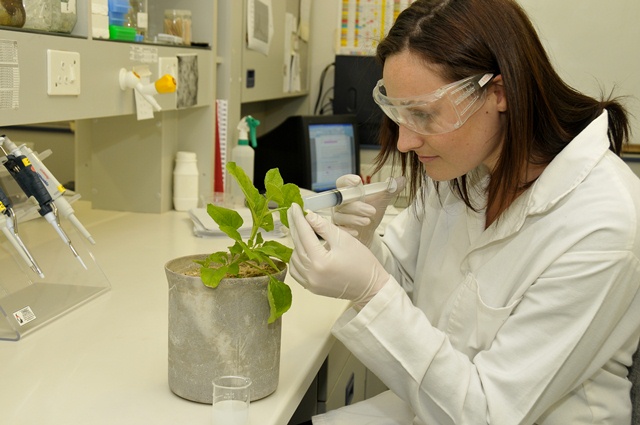The Vitis laboratory is a multi-disciplinary research group that mainly focus on the study of plant-pathogen interactions between woody perennial plants such as grapevine, citrus and pome fruit and their most important viral pathogens. To do this we utilise a range of molecular techniques from the basic to the cutting edge.
 Current plant virus and virus-like projects within the group include the study of Aster yellows phytoplasma (AY) and Grapevine leafroll-associated virus 3 (GLRaV-3), Grapevine rupestris-associated virus (GRSPaV) and Citrus tristeza virus (CTV) molecular variants and their interaction with different cultivars using diverse next-generation sequencing approaches such as sRNA-Seq, dsRNA-Seq and RNA-Seq. Within the group NGS technology is also used to characterise the virome and microbiome of individual plants through dsRNA-Seq and targeted amplicon sequencing. The use of NGS as a diagnostic for high-throughput unbiased simultaneous detection of all possible viral pathogens is being developed. Additionally, we are also constructing grapevine Ampelovirus infectious clones that, if successful, would give us the tools to make great advances in our understanding of the plant-pathogen interactions of this important virus genus.
Current plant virus and virus-like projects within the group include the study of Aster yellows phytoplasma (AY) and Grapevine leafroll-associated virus 3 (GLRaV-3), Grapevine rupestris-associated virus (GRSPaV) and Citrus tristeza virus (CTV) molecular variants and their interaction with different cultivars using diverse next-generation sequencing approaches such as sRNA-Seq, dsRNA-Seq and RNA-Seq. Within the group NGS technology is also used to characterise the virome and microbiome of individual plants through dsRNA-Seq and targeted amplicon sequencing. The use of NGS as a diagnostic for high-throughput unbiased simultaneous detection of all possible viral pathogens is being developed. Additionally, we are also constructing grapevine Ampelovirus infectious clones that, if successful, would give us the tools to make great advances in our understanding of the plant-pathogen interactions of this important virus genus.
The Vitis laboratory also embarked on a genome-sequencing project in which the Vitis vinifera cv. Pinotage, the only locally bred wine grape cultivar, will be sequenced. This ambitious long-term project has only been made possible by the advances in NGS technology in the last few years.
The Vitis laboratory is applying lessons learn in plant virology to the medical field. Currently we are studying the sRNA profiles in Mycobacterium tuberculosis (TB) patients blood serum for the purpose of developing biomarker assays that could be used for early diagnosis. We are also venturing into the field of Nanotechnology with a project that aims to use the unique properties of a plant virus to function as a biological nanoparticle that could be targeted to cancer cells for visualisation and treatment of prostate cancer.
Vironostix (Miss Mandi Engelbrecht) is the extension arm of the Vitis laboratory offering virus diagnostics on crops and ornamental plants using the latest RT-PCR assays.
Funders:
The Vitis laboratory receives funding from the following organisations: National Research Foundation (NRF), Wine industry network of expertise and technology (Winetech), Technology and Human Resources for Industry Programme (THRIP), Medical Research Council (MRC), Citrus Research International (CRI) and the Pinotage association (PA).
Current collaborators:
Dr Jasper Rees, Agricultural Research Council, Biotechnology Platform
Ms Glynnis Cook, Citrus Research International
Dr Shane Murray, Centre for Genomic and Proteomic Research (CPGR)
Prof Gerhard Walzl, Stellenbosch University (Tygerberg) Immunology Department
Dr Katharina Ronacher Stellenbosch University (Tygerberg) Immunology Department
Prof Nicole Steinmetz, Case Western Reserve University, USA
Prof Ed Rybicki, Molecular and Celular Biology, University of Cape Town
Dr Ann Meyers, Molecular and Celular Biology, University of Cape Town
Prof Massimo Delladone, University of Verona, Italy
[back to top]

